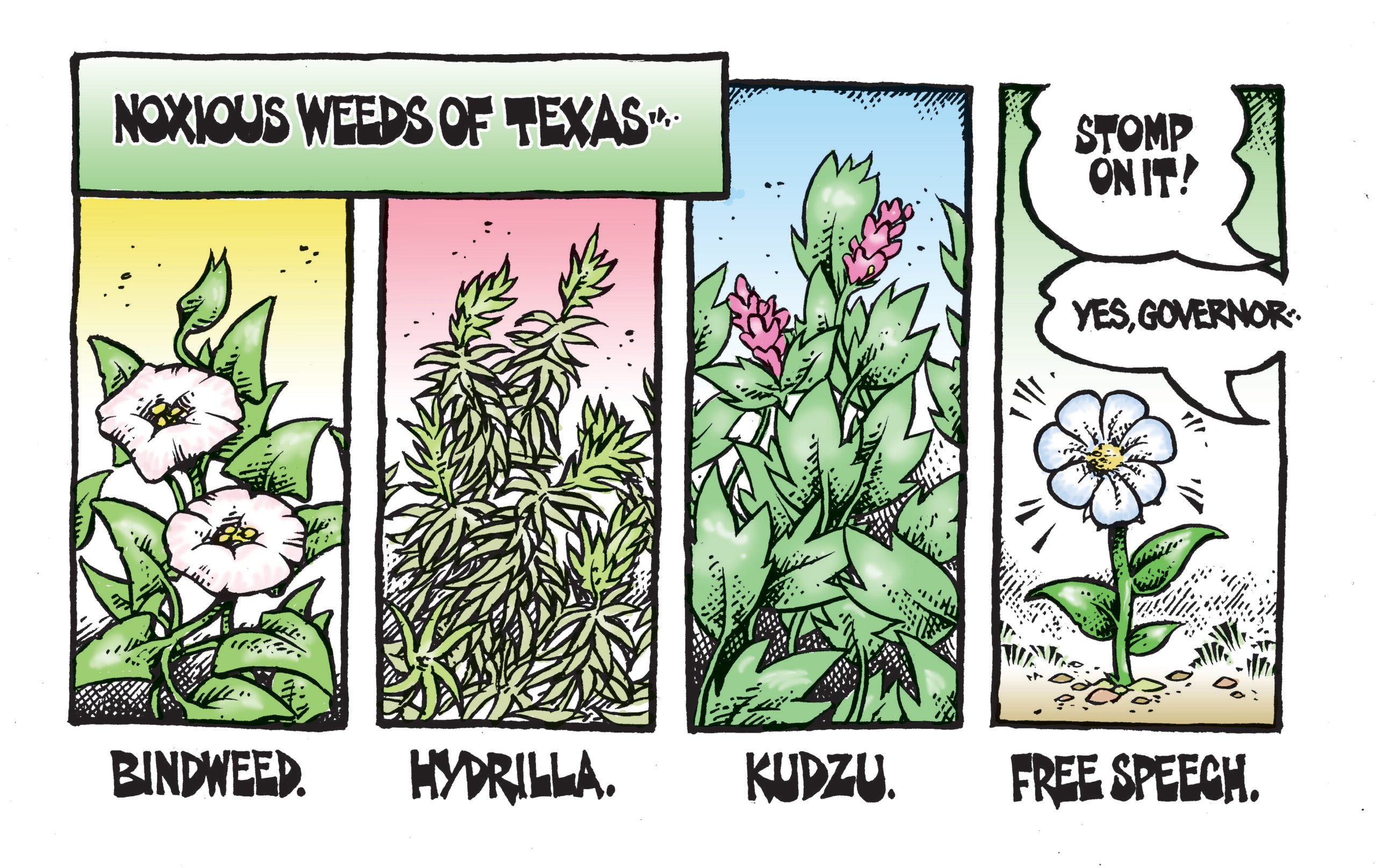ustxtxb_obs_1975_03_28_50_00009-00000_000.pdf
Page 24
under felony indictment for misuse of state funds. There was a fourth-place tie between a couple of perennial favorites, Rep. Jim Clark of Houston and Rep. Frank Gaston of Dallas. Sixth place was so heavily contested that it produced a four-way tie Joe Hubenak of Rosenberg, Tony Dramberger of San Antonio, Terry Canales of Premont, and Larry Vick of Houston. You will recall Hubenak for his valiant, on-going struggle against faraints; Canales was named Rookie of the Year last session, and Vick distinguished himself by calling the women’s rights movement “the most vicious, conniving, deceiving movement this country has ever seen, next to communism.” Tenth place produced yet another tie between two great worthies E.L. Short of Tahoka and Bud Sherman of Fort Worth. Also-rans, but close and getting one Green Stamp from the press corps, were Elmer Martin of Colorado City, Leroy Wieting of Portland, Pete Laney of Hale Center, and the only newcomer on the list, Tony Polumbo of Houston. Rounding out the top 19, all with five or more votes, were T. H. McDonald of Mesquite, Don Henderson of Houston, Emmett Whitehead of Rusk, and Speaker Pro Tern Dick Slack of Pecos. Our congratulations to the voters who elected them. Lawsy, lawsy, Gov. Dolph Briscoe has gone and replaced Jim Cotten of Weatherford, a certified curmudgeon called “Briscoe’s resident nit-picker” by the Houston Chronicle, with the one and only former Rep. Renal Rosson of Snyder. It’s like replacing Scylla with Charybdis. Rosson is classed as an administrative assistant to the governor and will review bills pending in the legislature. During his 16 years in the Lege he reportedly set an all-time record for killing bills. He used to begin his perorations by saying to his colleagues, “Lemme give ya’ a hypothetic.” Reclaimers indeed Major companies involved in strip . . mining, including Alcoa and Lone Star Steel, have formed TAHRA, the Texas Ad Hoc Reclamation Association. TAHRA lobbyists say they are committed to reclaiming stripped land, but they spoke against both Max Sherman’s and Lloyd Doggett’s strip mining bills in the Senate Natural Resources Committee recently. John Henry Faulk’s tribute to J. R. Parten, which appeared in the Observer’s Twentieth Anniversary Issue, was reprinted in the Congressional Record recently at the request of Rep. Richard Bolling of Missouri. Ben Barnes’ entanglement with the Sharpstown scandal primarily concerned a $60,000 loan Barnes had at Dallas Bank and Trust. According to Margaret Mayer in the Dallas Times Herald, “Barnes, making his way up in construction and finance worlds in Brownwood and Dallas, told friends he is now negotiating to buy Dallas Bank and Trust.” The security chief for Houston’s public school wants to make employees take lie detector tests in order to cut down on thefts of equipment by school system employees. Help for voters The Washington Post says the Ford administration is in favor of expanding the 1965 Voting Rights Act to Mexican-Americans. The act originally was intended to help get blacks registered and voting in the Deep South. Now the chairman of the U.S. Civil Rights Commission, Arthur S. Flemming, says that discrimination against chicanos “still infects the electoral process” in Texas and some other states. The commission has more than 100 pages of interviews concerning election practices in Uvalde and LaSalle, counties. One of the most frequent complaints was that Mexican-Americans in these two counties feared they would lose their jobs or their chances for promotion if they go against the anglo political establishment. says, “Polling places have been located in places where only whites normally congregate.” She remembers, “When Mexican-Americans tried to register in one town, they were told the registrar ran out of printed forms.” Jordan has introduced a bill that will extend the provisions of the Voting Rights Act to Texas, New Mexico, Arizona, and parts of Colorado and California. Jurisdiction would be extended to areas where less than 50 percent of the elegible voters were registered to vote or less than 50 percent of the elegible voters actually voted during the Presidential election of 1972. An area also would be covered if more than 5 percent of the eligible voters are of a single mother tongue other than English and the election and registration materials are printed only in English. Jordan’s bill has been criticized because it might unintentionally include ethnic groups other than Mexican-American. Another bill, introduced by Reps. Edward R. Youbal is directly aimed at “persons of Spanish origin.” There seems to be an upsurge in interest in assassinations. U.S. Rep. to set up a select committee to investigate the deaths of the two Kennedys, of Martin Luther King, and the attempted assassination of George Wallace. And former Tex. Sen. Ralph Yarborough is CORRECTION The Observer compounded a double error in its last issue by linking two appointments that had nothing to do with one another. Texas Chief Justice Joe Greenhill did not appoint Reuben Montemayor to the Board of Pardons and Paroles to replace William Skelton. Dolph Briscoe appointed Montemayor to the Board of Corrections, an altogether different transaction. calling for a new investigation of the JFK assassination. Yarborough, who was in the motorcade that day in Dallas, differs with the Warren Commission about the number of shots fired. The Zapruder film was shown in early March on ABC’s “Goodnight America,” a talk show that deals more in titillation than in serious public discourse. It was the first time the film had been shown in its entirety on national television, and it deserved better treatment than it got, which was third billing behind an interview with Raquel Welch and a short documentary on the Bermuda Triangle. Remember the three women who were sued \(Obs., million dollars because they criticized some Economy Publishing Co. books before the State Textbook Committee?’ Well, the State Board of Education has asked the company to drop the suit. If the company doesn’t comply, the board wants Atty. Gen. John Hill to assist the women in their defense. But board member Woodrow W. Bean of El Paso thinks the agency should let the courts decide the suit. Bean says, “When a state board recommends to anyone that a suit be withdrawn, we’re in trouble . . . . This would be establishing a terrible precedent.” Just for the record, a sharp-eyed reader of the Corpus Christi Caller spotted a couple of items pertinent to Our Time in one issue of that paper: “Tennis stars ponder $250,000 confrontation” and “$500 [from the Texas Institute of Letters] to be awarded writer making most significant contribution to human knowledge.” The community of Little Elm, pop. 500, decided to do something about rising electric bills. The folks there turned off their electricity. It was only for one night, and it only saved $45 or so \(there was the principle of the thing. Little Elm gets its electricity from the Denton County Electric Cooperative, which gets it from the Brazos Electric Power Cooperative. And, as Max Woodfin reported in the Observer Brazos system has been having some trouble with the price of the natural gas it uses to fire its generators. The cost has tripled in the last two years. March 28, 1975 9


